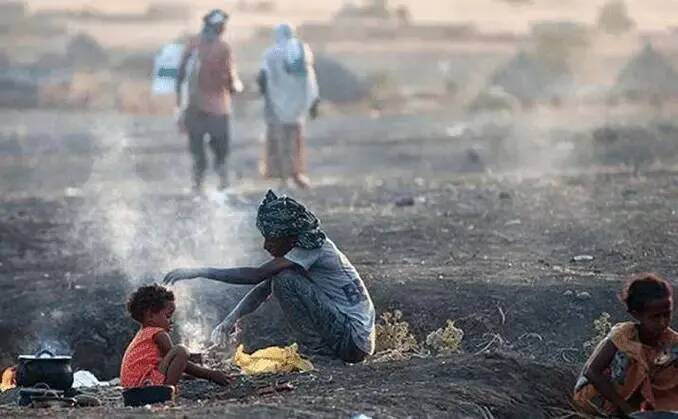Civil War and increased taxation! Ethiopia's coffee industry faces new challenges
Recently, the director of the Ethiopian Coffee and Tea Administration (ECTA) said that Ethiopian coffee is doing well in the Chinese market, with sales increasing by an average of 27% in recent years, according to local media reports.
In previous years, Ethiopia exported about 8000 to 10, 000 tons of coffee beans to China each year, when China ranked 33rd among Ethiopian coffee importers. However, in the past two years, Ethiopian coffee exports to China have increased by 50% to 20,000 tons, making it the eighth largest importer of Ethiopian coffee.
The director also said that Ethiopia's coffee exports to China have increased at an average annual rate of 27 percent over the past three years, mainly due to a sharp increase in Chinese coffee buyers. Moreover, Ethiopia exported 252000 tons of coffee to the global market in the first 11 months of fiscal year 24 in 2023, earning US $1.28 billion.
Although, at present, it seems that the development of the coffee industry in Ethiopia is strong, the domestic situation in Ethiopia is still grim. According to local media reports, the conflict between the Ethiopian federal government and Farno forces in Amhara continues.

At the end of May, the Ethiopian Government was deploying as many as 90000 recruits to the Amhara region and planned to carry out extensive military operations in the region within the next 10 days and eliminate Fano forces in the region within two weeks.
However, 10 days later, the report pointed out that the military operation was not aimed at achieving the government's expected goals, and that the action of the Ethiopian government forces almost failed. Fano forces also launched attacks on Bakhdhardo, the capital of Amhara state, according to the public relations director of Fano forces who claimed in an interview with the media that they had killed many government forces in the city.

At present, the Ethiopian government has not yet adopted activities such as negotiations with Farno forces, but some "peace meetings" have been held in many towns in Amhara, and the speakers of the Ethiopian Federal House are calling for an end to "killing each other" as soon as possible. and disarm the state of emergency in the region.
But for some farmers, the current conflict, which is concentrated in Amhara state in north-central Ethiopia, has not been affected, but various sources indicate that Fano's forces are weakening and expanding. If the government does not negotiate with Fano's forces, the situation will intensify and eventually lead to civil war.
In addition, Ethiopians have recently been dissatisfied with the government. It is said that Ethiopia's fiscal year is coming to an end, and lawmakers are proposing amendments to the value-added tax (VAT).
It is understood that the budget proposal mentions major government spending, totaling 971 billion bill, so the federal government aims to levy a tax of 502 billion bill, mainly including the revision of the current value-added tax and consumption tax law, as well as the implementation of new taxes such as real estate tax and green tax.
As for the new tax law, some participants believe that VAT is a "transfer tax", which will increase the cost of enterprises, but will eventually be passed on to consumers, exacerbate price inflation and is not conducive to commodity exports. And VAT also includes basic foods such as biscuits in VAT, which goes against the original intention of the tax law to protect vulnerable groups, as biscuits are a common source of food in many industries, including coffee growers.
Although the VAT is currently under negotiation, officials expect the bill to be passed and its provisions to take effect early next year, which will have an impact on a number of industries. To this end, coffee industry insiders said that the future situation in Ethiopia is very uncertain, and the current situation will lead to a decrease in Ethiopian coffee exports and a rise in coffee prices in the future.
Important Notice :
前街咖啡 FrontStreet Coffee has moved to new addredd:
FrontStreet Coffee Address: 315,Donghua East Road,GuangZhou
Tel:020 38364473
- Prev

Demonstrations break out in Kenya! New government policy threatens coffee industry
Earlier, the U.S. Department of Agriculture released the current situation of Kenya's coffee industry. The report pointed out that the impact of previous heavy rains and the reduction of coffee planting area are expected to be 750,000 bags (60 kilograms/bag) in Kenya's 2024/25 marketing year, a decrease of 6.3% from the previous marketing year. However, politics
- Next

Introduction to Las Nieves Estate, Mexico's 2024 COE Sun-Denise Treatment Group Champion
In North America, coffee is grown in many countries, such as El Salvador, Honduras, Costa Rica, Mexico, etc. due to their suitable geographical environment and other conditions. Among them, Mexico is the tenth largest coffee producer in the world, and in recent years, many excellent coffee beans have been produced. Mexio Mexico
Related
- What grade does Jamaica Blue Mountain No. 1 coffee belong to and how to drink it better? What is the highest grade of Blue Mountain coffee for coffee aristocrats?
- What are the flavor characteristics of the world-famous coffee Blue Mountain No. 1 Golden Mantelin? What are the characteristics of deep-roasted bitter coffee?
- Can I make coffee a second time in an Italian hand-brewed mocha pot? Why can't coffee be brewed several times like tea leaves?
- Hand-brewed coffee flows with a knife and a tornado. How to brew it? What is the proportion of grinding water and water temperature divided into?
- What is the difference between Indonesian Sumatra Mantinin coffee and gold Mantinin? How to distinguish between real and fake golden Mantelin coffee?
- What does bypass mean in coffee? Why can hand-brewed coffee and water make it better?
- Unexpected! Ruixing Telunsu lattes use a smoothie machine to foam milk?!
- % Arabia's first store in Henan opens into the village?! Netizen: Thought it was P's
- Does an authentic standard mocha coffee recipe use chocolate sauce or powder? Mocha Latte/Dirty Coffee/Salty Mocha Coffee Recipe Share!
- What is the difference between Vietnam egg coffee and Norway egg coffee? Hand-brewed single product coffee filter paper filter cloth filter flat solution!

